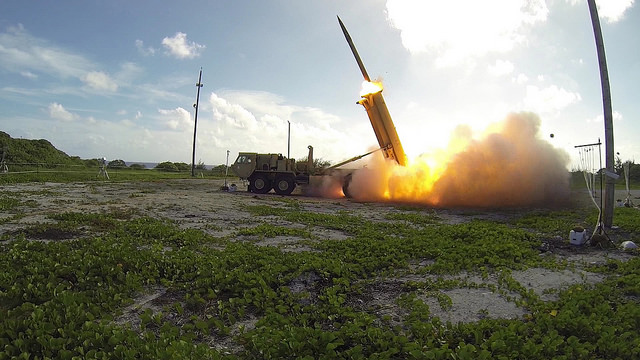ASPI suggests

Welcome back to ASPI suggests. This week’s unsolicited advice is to never use all your A-material on the first try—just in case you’re invited to perform once again.
On Monday, North Korea test-launched a second intercontinental ballistic missile, just three weeks after the first. I’m not going to delve into the technical aspects here—but you should. Suffice it to say that the missile demonstrated two things: longer range and technical improvements. Expert commentary has paid special attention to the re-entry vehicle, which may have been experimentally light, which probably explains the longer range (thankfully, that part makes sense to those of us with a science education that only goes to high-school physics).
The fallout (pun intended) has been extensive: South Korea’s new president, Moon Jae-in, has reversed his position on the deployment of an American THAAD missile defence system on South Korean soil. Moon suspended the deployment of THAAD back in early June as part of a concerted effort to strike a softer tone on relations with North Korea and repair the relationship with Beijing. But Monday’s launch brings the total number of North Korean missile tests this year to 12, which makes a pretty credible case for missile defence. And it’s not just the South Koreans talking about ballistic missile defence—it’s us, too (this Strategist piece from early July is a great way to read yourself in).
There’s some fresh analysis on the Hermit Kingdom coming out, too. Carnegie’s Jon Wolfsthal is saying we should ‘give up on denuclearizing North Korea’ and focus on deterrence. And a piece at 38 North says we should be cautious about contemplating ‘regime change’ in North Korea, citing a better-the-devil-you-know line of reasoning. That’s certainly more sophisticated analysis than we’re seeing from Philippines president Duterte, who called Kim Jong-un a ‘chubby’ SOB this week.
In other Southeast Asia news, this coming Tuesday is the 50th anniversary of ASEAN (how’s that for a segue?). You’re going to see plenty of content here at The Strategist on that subject, but it’s a good opportunity to share some recent news and analysis about our near neighbours.
Continuing violence in Mindanao is driving regional collaboration on ISIS-linked extremism; Attorney-General George Brandis met with representatives from Indonesia, Brunei, Malaysia, New Zealand and the Philippines to discuss a variety of terrorism-related matters last weekend, with a special focus on managing the return of foreign fighters from the Middle East.
Meanwhile, Singapore has opened a new military training facility, the Island Defense Training Institute, which will focus on homeland defence and island defence—clearly a convergence of priorities for the island nation. The Singaporeans have also recently wrapped up a big joint land exercise with the US Army, Tiger Balm 2017 (make your own jokes, if you so desire).
Last on the ASEAN side of things, US secretary of state Rex Tillerson will be arriving in the region this weekend, and you can get a good summary of the likely outcomes at The Diplomat, courtesy of Prashanth Parameswaran.
For your weekly research and long-read fixes, may I suggest a six-part series from Brookings about the current challenges to the US foreign aid program. The briefs cover multiple angles, including the trials of delivering foreign aid to violent regions, multilateral cooperation, and the potential impacts of Donald Trump’s ‘America First’ policy.
There’s also a compelling essay in the Financial Times, called ‘Syria: a tale of three cities’, which looks at the impacts of the ongoing civil war on the cities’ populations. If you need a lighthearted read this week (maybe immediately after reading that Syria piece), check out the story of how Pakistan’s now-ex-PM, Nawaz Sharif, was caught lying thanks to a Microsoft font.
Podcasts
This week’s CSIS Smart Women, Smart Power podcast features a discussion with AT&T vice president Jill Singer about ‘the internet of things’, privacy and policy. (That’s the kind of discussion we at ASPI are trying to help foster in Australia, too: we hosted NSA director Admiral Mike Rogers on Monday night and launched a new publication on big data in national security this week). If you’re still interested in the nitty-gritty of cyber norms after the above, look no further than The Strategy Bridge for some analysis of the Ise-Shima variety.
Did you know the International Spy Museum has a podcast? It’s aptly named Spycast. The latest episode is an interview with former CIA analyst and author Melvin Goodman about his life in intelligence and his most recent book, A whistleblower at the CIA.
Video
This one’s not exactly a video, but an interactive introduction to game theory that you can play in your web browser. The creators recommend setting aside about 30 minutes to get the full experience.
Who has honestly never wanted to be an action hero? How can we then blame Turkmenistan’s president Gurbanguly Berdymukhametov for taking the opportunity to have a video made of him shooting targets and calling in helicopter strikes? If the intro looks familiar, that’s because an opposition website edited in scenes from the classic 1985 Schwarzenegger action flick Commando. (3 mins)
Events
Sydney: The Lowy Institute will host an evening discussion on 14 August with Prime Minister Monasseh Sogavare of Solomon Islands on the legacy of RAMSI and the future of Solomon Islands.
Multiple locations: It’s not often we share an event exclusively for high-schoolers, but I’m sure many Strategist readers have teenage children who love everything to do with space. While the events don’t start until mid-September, expect registrations for the UN Youth Australia Space Summit across the country to fill up quickly (students years 9–12).